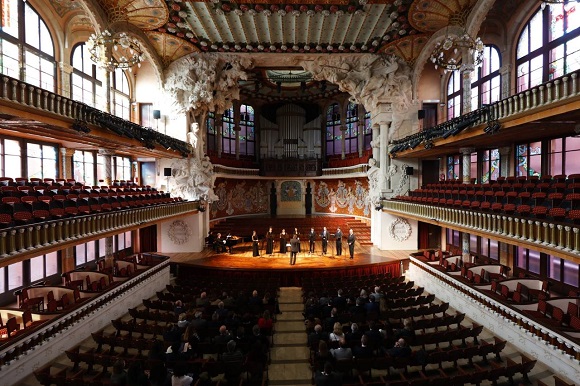- The Ministry for Foreign Action and European Union and the Ministry of Culture organise a conference at the Palau de la Música to present Catalan culture to the diplomatic corps accredited in Catalonia

The Catalan Minister for Foreign Action and European Union, Meritxell Serret i Aleu, and the Catalan Minister of Culture, Natàlia Garriga i Ibáñez, together with the President of the Fundació Orfeó Català - Palau de la Música Catalana, Joaquim Uriach i Torelló, presented the first edition of the Catalan Culture Day at the consular corps, a programme of activities for diplomatic representatives in Catalonia to learn first-hand about the potential of Catalan culture, its art and heritage, and the country's most significant cultural facilities, as well as the Catalan monuments and cultural expressions that have been declared World Heritage Sites by UNESCO.
In her welcoming speech, Minister Serret stressed the Catalan Government's desire to "be useful to the consular corps" and to "continue to bring you the best of our country". For this reason, she added, the Catalan Culture Day is being promoted, because "the internationalisation of culture is one of the cornerstones of our foreign action". "We are proud of the diversity of cultures and people living in Catalonia. Defending one's own culture and language goes hand in hand with defending this diversity", Serret stressed. "If we talk about Catalan culture, we must talk about language, which is one of this government’s priorities", said the Catalan Minister for Foreign Action, and she said that one of the consular corps' next outings will bring the reality of the Catalan language closer to them "so that they can experience the linguistic reality of Catalonia".
On the other hand, Minister Garriga stressed that this meeting with the consular corps will serve to establish "new links and new dialogues to improve knowledge of our cultural reality". In this respect, Garriga explained one of the most relevant projects of the moment in the cultural sphere, which is the National Pact for Language, a project based on social and political consensus. "The future of Catalan involves all of us. You, as consuls, are role models and examples, and we count on your complicity; that is why meeting points such as this first Catalan Culture Day are so important", she told them.
This first Catalan Culture Day took place in the only concert hall to be declared a UNESCO World Heritage Site, the Palau de la Música Catalana, designed by the architect Lluís Domènech i Montaner. The president of the Fundació Orfeó Català - Palau de la Música Catalana, Joaquim Uriach, explained how the Palau has been the venue for many key cultural events in the history of the country and is still today an essential meeting point for Catalonia’s cultural and social life.
The event included a reception in the rehearsal room of the Orfeó Català, presided over by the two ministers. This was followed by a guided tour of the Concert Hall, after which the consular corps enjoyed a concert by a vocal octet of the Chamber Choir of the Palau de la Música Catalana, with a repertoire of carols by Mark Hayes and Albert Guinovart, conducted by Xavier Puig and with Jordi Armengol at the piano. At the end of the concert, the consuls were offered a cocktail and a networking session.
Catalan Culture Day
Catalan Culture Day is a programme of activities for the consular presence in Catalonia with the aim of creating links for the promotion of Catalan culture abroad and improving knowledge of the cultural reality of the communities present in our country. With this initiative, the Government wants to open up avenues of collaboration and create future synergies.
The programme is yet another example of the Ministry for Foreign Action and European Union's desire to bring Catalonia's main assets closer to diplomatic staff and accredited representatives from other countries. The aim is to detect opportunities and create complicities between Catalonia and third countries through cultural, economic, social, academic and institutional actors, among others. The Government of Catalonia is working to forge alliances and frameworks for strategic cooperation with all the international actors based in Barcelona. This is why the Ministry for Foreign Action and European Union organises activities and workshops for the government, the consular corps and different actors in the country. Exactly one year ago a Christmas reception was organised for the consular corps at the Palau de Pedralbes, and also with the aim of internationalising Catalan culture, in January this year avisit to the MNAC was organised including a meeting with the country's cultural facilities.